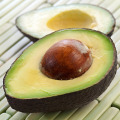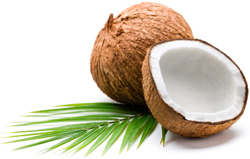 Are you afraid of fats? If so, you’re not alone.
Are you afraid of fats? If so, you’re not alone. Fat in foods has been vilified in America for the past few decades, as low-fat and non-fat foods became the norm, and we were told that a low-fat diet would help us get the body we want. In fact, it’s one of the biggest nutrition lies that the public’s been told. Numerous studies have since debunked the myth. It’s been proved there is no evidence that dietary saturated fat increases a person’s risk for coronary heart disease or cardiovascular disease.
We’re only now realizing the truth: Not all fats are created equally. Our bodies need fat — more specifically, they need healthy fats.
___________________
Not all fats are created equal, but the ones below pack a lot of punch.
1. Avocados
The benefits of avocados are so numerous that they’re one of the healthiest fruits you can consume.
· They’re rich in monounsaturated fats, which raise levels of good cholesterol while lowering the bad — talk about a double-whammy.
· Avocados are also packed with the benefits of vitamin E, which help prevent free radical damage, boosts immunity and acts as an anti-aging nutrient for your skin.
· They have more healthy protein than any other fruit.
· Get more avocados in your diet and try one of these avocado recipes.
avocado-recipes
2. Butter
Real butter — preferably raw or from grass-fed, organic sources.
Avoid “butter-like” substances; margarine, I Can’t Believe It’s Not Butter and all those other “vegetable oil spreads” found in stores.
· The omega-6 and omega-3 fatty acids found in butter help your brain function properly and improve skin health. The body needs these two fatty acids them but can’t produce them on its own; they must be derived from food sources.
· Butter’s also rich in fat-soluble vitamins and trace minerals, including beneficial selenium, a powerful antioxidant.
· Butter is not great for cooking at high temperatures because of its low burning temperature.
Ghee — This is the Indian version of butter. Look for organic or grass-fed cultured ghee.
· It has a high smoke point, making it ideal for cooking at high temperatures.
· Ghee is loaded in fat-soluble vitamins A, D and E which keep your metabolism and digestion on track.
· Its high levels of vitamin K2 also helps strengthen bones.
· It’s lactose- and casein-free.
3. Coconut Oil
It’s medium-chain fatty acids, which are easy for your body to digest, not readily stored by the body as fat and infuse cells with energy almost immediately.
· The fatty acids improve brain and memory function.
· Coconut oil increases good cholesterol and promotes heart health.
· Its Antioxidants make it an effective anti-inflammatory food and help reduce arthritis.
· Choose extra virgin varieties, as refined or processed coconut oils can eliminate many of the health benefits.
Adding coconut oil to your diet is easy.

Coconut Boosters Recipe
4. Extra Virgin Olive Oil
Olive oil benefits are so profound that any diet should include it. Extra virgin olive oil (EVOO) that is.
· It reduces the incidence of heart attack or dying of heart disease, probably due to its high levels of monounsaturated fats.
· The high amount of antioxidants in EVOO means it protects your cells from damage.
· It helps improve memory and cognitive function, and works as an anti-inflammatory.
Some tips for recognizing real EVOO
· Beware of any brand that costs less than $10 a liter. There are “fake” ones out there that use chemicals when the oil is refined.
· Look for a seal from the International Olive Oil Council; check the harvesting date on the label; if it’s labeled as “light,” “pure” or a “blend,” it isn’t virgin quality.
· Opt for dark bottles, as they protect the oil from oxidation.
EVOO isn’t recommended for cooking at high temperatures because of its low smoke point, but it’s terrific for making salad dressings or drizzling over breads or cooked foods.
5. Omega-3s
Omega-3 fatty acids are considered essential because the body isn’t capable of producing them on its own. Therefore, we must rely on omega-3 foods in our diet to supply these extremely beneficial compounds.
· The preferred sources of omega-3s are the kinds found in seafood sources like nutritious salmon and sardines.

· Another source is found in certain nuts (especially walnuts) and seeds (Chia and Flax seeds)
· High-quality cuts of meat like grass-fed beef.
· Vegetables highest in omega-3s include Brussels sprouts, kale, spinach and watercress and other green leafy ones.
Omega-3s are best obtained through the food that you eat. For most people, two 6 oz. servings of fatty fish a week, as well as regular servings of other foods mentioned above, provides a healthy amount.
If you opt for fish oil supplements, look for 700 to 1,000 mg of EPA and 200 to 500 mg of DHA per day
These healthy fats can also help keep you feeling full!!
